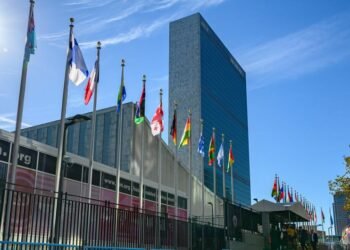Saudi Arabia’s Deputy Minister for Human Resources, Abdullah bin Nasser Abuthunain, has announced the Kingdom will ease “foreign workers’ contractual restrictions, including the freedom to change jobs.”
The plans, which will take effect in March 2021, include foreign workers’ right to leave the country without employers’ permission, Mr Abdullah bin Nasser Abuthunain told reporters.
He added that the aim is to improve Saudi Arabia’s labour market attractiveness.
Restrictions in Saudi Arabia have tied millions of low-paid and vulnerable migrant workers to their employers in conditions that have been associated with abuse and exploitation.
The Ministry of Human Resource and Social Development said the reforms will allow foreign workers the right to change jobs by transferring their sponsorship from one employer to another, leave and re-enter the country and secure final exit visas without the consent of their employer, which had long been required.
The new “Labour Relation Initiative” will affect approximately 10 million foreign workers in the kingdom, who constitute about a third of Saudi Arabia’s total population.
Human Rights Watch researcher, Rothna Begum said the information provided thus far “shows Saudi authorities are removing some elements of the kafala sponsorship system in place across multiple Gulf Arab states that tie foreign workers’ legal status to their employer.”
Qatar introduced similar changes to its labour laws recently.
Begum also described the changes to the Saudi law as “significant steps that could improve migrant workers’ conditions”, but warned it does not appear to be a full abolition of the “kafala” system.
“Migrant workers still need an employer to sponsor them to come to the country and employers may still have control over their residency status.”
Under Saudi Arabia’s restrictive “kafala” system, workers have little power to escape abuse because their employers controlled their exit from the country and their ability to change jobs.

The reforms are reported to be part of a broader plan known as Vision 2030 spearheaded by Crown Prince, Mohammed bin Salman (MBS) to make the kingdom more attractive to foreign investors, expand the private sector and diversify the kingdom’s oil-dependent economy.
May Romanos, a researcher on migrant rights in the Gulf with Amnesty International, said “the devil is usually in the details” and that until Saudi Arabia publishes the new reforms and fully enforces them, it is very difficult to assess the effect these promises will have on the rights of migrant workers in the country.
Begum added that it remains to be seen whether these latest changes to the labour law will apply to all migrant workers, including domestic workers such as maids and nannies.
Moreover, the information released does not specify whether employers can report workers for escaping. Begum raised concern about the rule which states “if an employer reports a worker for escaping or is able to cancel a worker’s visa before that person can request a transfer of employment, they can become undocumented in the country and then liable to arrest and deportation.
“This is why a full abolition [of ‘kafala’] is necessary. Partial reforms like removing the need for employer consent to change employers and leave the country are significant, but workers can become trapped in other ways when such elements remain.”





















